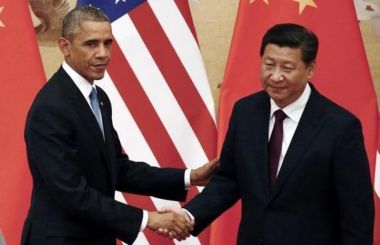Obama urged to condemn China's 'extraordinary assault' on human rights

Leading US senators have urged Barack Obama to use the visit to Washington next month of Chinese President Xi Jinping to take him to task for an "extraordinary assault" on human rights.
Ten senators, led by Ben Cardin, top Democrat on the Senate Foreign Relations Committee, and John McCain, Republican chairman of the Senate Armed Services Committee, said Obama should make human rights "a key and public component" of his talks with Xi.
"Under President Xi, there has been an extraordinary assault on rule of law and civil society in China," including the detention or harassment of more than 250 lawyers and activists since July 9, the senators said in a letter to Obama.
"We ask that you call publicly and privately for China's immediate release of these detained lawyers and activists, or at the very least, that China grant them due process," it said.
The senators said they hoped Obama would press China to respect religious freedom and release Nobel Peace Prize winner Liu Xiaobo and other political detainees.
The Senators also criticised Xi's draft law for foreign non-governmental organisations, saying it could force many NGOs, educational and cultural institutions to pull out of China.
"The rise of civil society in China has been one of the only human rights success stories of the past two decades, and it is imperative the US speak up to protect it," the letter said.
It added that senators expected Obama and Xi to also discuss China's pursuit of territorial claims in East Asia, recent cyber attacks, economic and trade issues and climate change.
"While these issues deserve and full and robust exchange of views, so too do human rights," they said.
Xi is expected to spend about a week in the United States in the second half of September. He will hold talks with Obama in Washington and also attend the UN General Assembly.
A Chinese government campaign against Christian churches has drawn international attention since it began nearly two years ago. More than 1,200 crosses have been removed from churches in Zheijang and some churches have also been demolished, including the multi-million dollar Three Self Patriotic Movement church in Wangling and the $5 million Sanjiang church in Wenzhou, both in Zhejiang.
Religious persecution
In a recent interview with Christian Today, the president of human rights organisation China Aid, Bob Fu, called for the US to be much tougher on China over religious persecution.
He called for a global 'Magnitsky Act', legislation used to call to account Russian officials held responsible for the death in prison of the lawyer Sergei Magnitsky and involving travel bans and the freezing of assets.
Fu said the Chinese government had begun an organised crackdown on Christianity because of its remarkable growth over the last few decades, instigated by the President Xi Jinping. Persecution was particularly marked in Wenzhou, known as the 'Jerusalem of the East' for the number of its churches. According to Fu, around 1,500 churches had been demolished or had their crosses taken down in the province, and significantly, almost all were officially recognised congregations. "This is unprecedented," he said. "It is the first time this has happened since the Cultural Revolution."
He said there were signs that persecution was spreading to other provinces as well and that in keeping with Chinese practice for major policies, one province – Wenzhou – had been used as a testbed.
Fu said: "You would think that the Church's contribution to the stability of society – its charitable work with the needy and with victims – would be praised. But it is the nature of the Communist Party that it will not tolerate competition for minds and hearts. Christianity has grown so fast that Christians outnumber Communist Party members. The whole purpose of this is to control the 'overheated' growth of Christianity. They are nervous not just about Christianity but of any organised civil group."
Fu said President Barack Obama's administration had taken a "business-oriented" approach and was more reluctant to make human rights an issue. "That is a strategic mistake," he said, adding that it showed the US as "weak, intimidated by China's economic power into ignoring and downgrading core values".
Additional reporting by Reuters.











